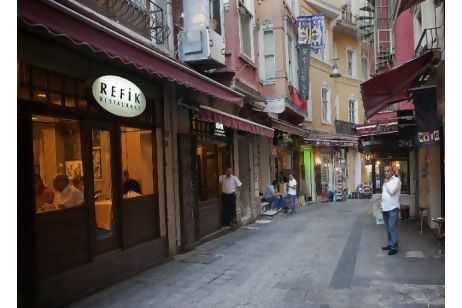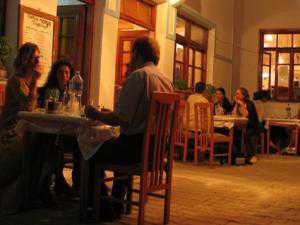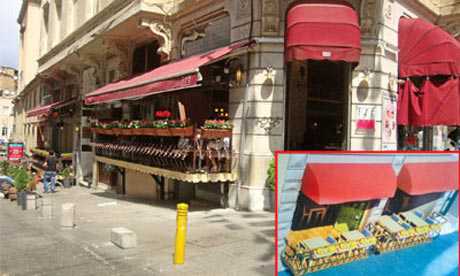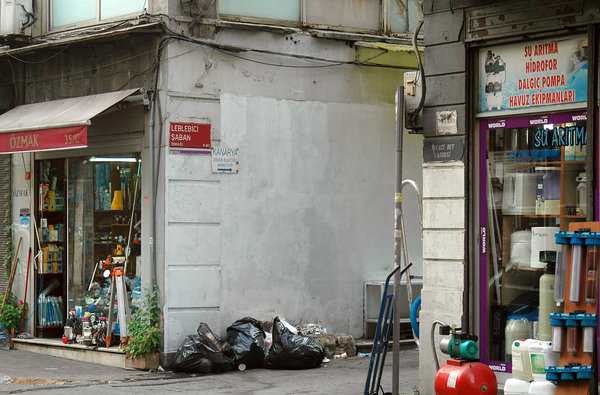Thomas Seibert

ISTANBUL // Mahmut Kaya looked out over the empty street in the heart of Istanbul’s nightlife district and shook his head as if he still could not quite believe it.
Only a few weeks ago streets such as the one outside the Refik restaurant, where Mr Kaya works in the kitchen, were filled with neatly set tables.
But one day in late July officials from the district municipality removed all the tables and by doing so kicked off the latest debate about what government critics say is increasing Islamist pressure to change Turkey’s secular republic.
“They do not want to see people drinking alcohol in the street,” Mr Kaya said as he sat on a chair at Refik’s this week, waiting for lunchtime guests in the empty restaurant. “It has hurt us,” he said about the removal of about half a dozen street tables, roughly half of what Refik has inside.
“There used to be 200 to 300 people here every day. Now we have 50 to 60. It’s summer. No one wants to sit indoors.”
Beyoglu, the bar-filled district around Refik, is a prime attraction for millions of tourists in Istanbul every year. While other parts of the city represent the history and rich cultural heritage of what used to be the capital of the Byzantine and Ottoman empires, Beyoglu is all about dancing, shopping, eating and drinking until the early hours.
But the “Table Operation”, as it has become known in the media, makes some critics wonder whether the religiously conservative government of Recep Tayyip Erdogan, the prime minister, is trying to clamp down on the district’s freewheeling lifestyle.
Mr Kaya and others referred to unconfirmed reports that Mr Erdogan, a conservative Muslim, passed through Beyoglu shortly before the start of Ramadan. Mr Erdogan, so the story goes, got stuck in his car in one of the side-streets because of the crowds and the tables on the streets and became angry when revellers lifted their wine and beer glasses to greet him. A few days later, the “Table Operation” began. Mr Erdogan has not commented on the suggestions.
The authorities say the aim of the “Table Operation” was to make life easier for citizens in Beyoglu who had trouble getting through some streets that had become narrow passageways because of the many restaurant tables placed on the pavement.
Business owners “were just thinking about how to earn even more money”, Sadettin Ozyazici, the deputy chairman of Istanbul’s municipal police force, told Turkish reporters last week. He said “on the whole, reaction of people has been positive”.
Even some Refik employees supported the municipality’s move. “Nobody was able to get through here any more,” said Ahmet Arslan, 74, who has worked as a chef in Beyoglu for decades. “There were also pickpockets that snatched stuff from the street tables.”
Critics of the “Table Operation” admitted that some bar owners had put far more tables on to the streets than they had permission for.
But that has not dampened the debate about the alleged religious motives behind the action.
“Beyoglu is not a place where you greet tourists just with some sweets,” Gursel Tekin, a deputy leader of the secularist Republican People’s Party, or CHP, Turkey’s biggest opposition party, said at a demonstration against the “Table Operation”.
Operations to clear away restaurant tables have been reported in other parts of Istanbul as well.
Actions such as the one in Beyoglu “help to strengthen the conservative hegemony” of Mr Erdogan’s ruling Justice and Development Party, or AKP, Armagan Ozturk, a political scientist, wrote in a commentary for bianet.org, an EU-sponsored news website.
Since coming to office almost 10 years ago, Mr Erdogan’s government has often been accused of following a secret agenda to turn Turkey into an Islamic theocracy, a charge the government denies, pointing to its track record of political reforms that have strengthened democracy. Also, alcohol consumption in Turkey has risen, not fallen, under Mr Erdogan, according to official statistics. According to figures released this year, 1.4 billion litres of alcoholic beverages were consumed in Turkey in 2010, 1.4 per cent up from 2009.
Tahir Berrakkarasu, the vice-chairman of the Association of the Entertainment Sector in Beyoglu, a local pressure group, said he doubted there had been religious reasons behind the “Table Operation”.
“If this was about Islam, why didn’t they do it during last year’s Ramadan?” Mr Berrakkarasu, a fierce critic of the programme, asked over a glass of tea in a Beyoglu side-street cafe.
Mr Berrakkarasu speculated that the “Table Operation” was triggered by Mr Erdogan’s anger about getting stuck in that Beyoglu street. The prime minister had probably ordered the AKP-controlled district municipality to do something about it, Mr Berrakkarasu said.
“All of a sudden, people at the municipality with whom we have been talking for years did not pick up their telephones when we were calling, because they didn’t know what to tell us,” Mr Berrakkarasu said. He compared the “Table Operation” to the fate of a monument in the eastern Anatolian city of Kars, where the city administration decided to tear down the work of art after Mr Erdogan called it “monstrous” during a visit this year.
Whatever the motives behind it, the “Table Operation” has cut business by up to 80 per cent for some restaurants, Mr Berrakkarasu said. His association was trying to find a way out. “We can find practical solutions. It’s not like having to discover America all over again.”
He said his association was preparing to present plans with solutions for next year’s summer season to both the AKP and the CHP. A stricter limit on street tables was inevitable, Mr Berrakkarasu conceded. “There will be no return to the old days.”



